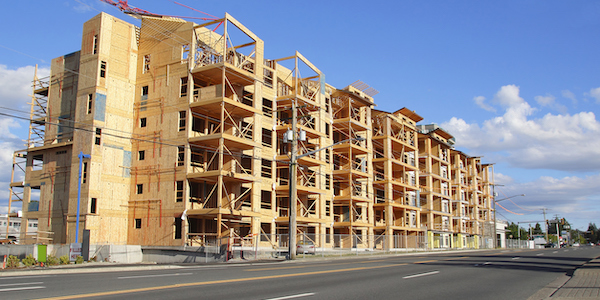Multifamily Confidence Up Strongly Amidst Challenges
Originally Published by: LBM Journal — May 20, 2021
SBCA appreciates your input; please email us if you have any comments or corrections to this article.

Confidence in the market for new multifamily housing increased in the first quarter of 2021, according to results from the Multifamily Market Survey (MMS) released by the National Association of Home Builders (NAHB). Multifamily sentiment declined at the end of 2020.
The MMS produces two separate indices. The Multifamily Production Index (MPI) increased eight points to 51 compared to the previous quarter. This is the first time the MPI has been over 50 in seven quarters. Meanwhile, the Multifamily Occupancy Index (MOI) increased one point to 59.
The MPI measures builder and developer sentiment about current conditions in the apartment and condo market on a scale of 0 to 100. The index and all of its components are scaled so that a number above 50 indicates that more respondents report conditions are improving than report conditions are getting worse.
The MPI is a weighted average of three key elements of the multifamily housing market: construction of low-rent units-apartments that are supported by low-income tax credits or other government subsidy programs; market-rate rental units-apartments that are built to be rented at the price the market will hold; and for-sale units-condominiums. All three components increased in the first quarter: the component measuring low-rent units rose four points to 46, the component measuring market rate rental units increased six points to 54 and the component measuring for-sale units jumped 13 points to 52.
This quarter, the report introduces a new index: the Multifamily Occupancy Index, or MOI. The MOI replaces the former Multifamily Vacancy Index, or MVI, and is based on the same underlying data. The MOI measures the industry’s perception of occupancies in existing apartments. It is a weighted average of current occupancy indexes for class A, B, and C units, and can vary from 0 to 100, with a break-even point at 50, where higher numbers indicate increased occupancy. With a reading of 59, the MOI has improved over the last three quarters.
“We continue to see strong demand for rental housing, especially in the suburbs,” said Justin MacDonald, president and CEO of The MacDonald Companies in Kerrville, Texas, and chairman of NAHB’s Multifamily Council. “But an increase in building material prices and difficulties obtaining approvals remain significant headwinds for the industry.”
“The MPI reversed trend and rose strongly in the second quarter of last year, one quarter before a similar turn-around in the multifamily housing starts data,” said NAHB Economist Robert Dietz. “Since then, multifamily starts have mirrored the MPI. The surge that we saw in the MPI for the first quarter of 2021 coincides with a similar surge in multifamily starts to a seasonally adjusted annual rate of more than 450,000 units. Based on these recent numbers, NAHB now expects a gain in multifamily starts this year.”

